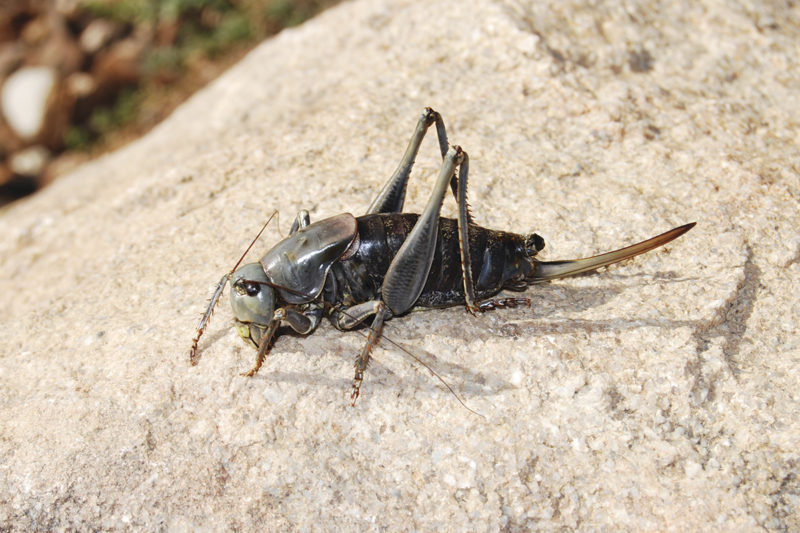Warning: This column contains recipes that should not be taken seriously. In fact, there is very little in this column that should be taken seriously.
It usually happens when you’re riding an open-air vehicle – be it a motorcycle, bicycle or horse. The speed sends a tickle in your tummy and a shiver down your spine. You barely crack a smile, and then it happens … a bug flies in your mouth and down your gullet. No matter how much you spit, it’s not coming out, and there you have it … you’ve eaten a bug.
Did you know that nearly 2 billion people worldwide rely on insects as a protein source? According to archaeological discoveries, the indigenous peoples of the Intermountain Northwest utilized insects. Archaeologists in Idaho found a type of cake made from ground Great Basin rye seeds and ants. The dough was cooked, and the ants contain a natural preservative. Two-hundred-year-old cakes have been discovered, still preserved … like prehistoric Twinkies.
Way back in 2012, ABC News reported that chocolate allergies could be linked to an allergen in cockroaches. In the intervening years, the fact checkers claim the allergy is more likely the sugar and milk, and the allowable number of insect parts is less than 60 per 100 grams of chocolate, according to the FDA. (If they are trying to save the chocolate industry, shouldn’t the fact checkers claim there aren’t any incidental bugs in chocolate?)
Demand for chocolate rose 13% following the report, proving that Americans will eat bugs … at least chocolate-covered bugs.
But there is a serious push to encourage Americans to eat bugs. Just so you know, “entomophagy” is the eating of insects. Using this term is much like using “coprophagia” to describe your dog eating horse poop. Referring to the eating of insects as entomophagy only makes the name more scientific. The act is still gross.
As you know, the planet is facing an existential climate crisis. And animal agriculture (more commonly known as cow farts) is responsible for nearly 20% of the greenhouse gas emissions in the U.S. Switching your protein source from animal to insect will make so much of an impact on greenhouse gases that you can watch coal-powered TikTok videos without an ounce of guilt.
I am embracing the new entomophagy movement. Think of our neighbors in Nevada who can now raise free-range Mormon crickets. Sell your cows … herd and harvest this more sustainable source of protein.
I should include my favorite insect recipe:
Mormon cricket green Jell-O
- Shred 1 cup of Mormon crickets into the bottom of a 9-by-13 serving dish.
- Add a 3-ounce package of lime Jell-O, along with some warm water.
- Refrigerate to set.
- Optional: Add mealworms to the crickets if you are nontraditional. Yum, yum.
Editorial comment: If mankind’s survival relies on me eating insects, let me be the first to say … it’s been a good run, would the last human please turn out the lights, and better luck to the chimpanzees or whoever takes our place at the top of the food chain. I’m not replacing my steak with bugs.
In a Feb. 9, 2022, opinion on the World Economic Forum (WEF) website, two Indiana professors make the case for the switch to insects. According to the professors, insects provide an equivalent amount of protein, require less upkeep, have a lower carbon footprint and can keep more agricultural waste out of landfills than animal agriculture.
Ready for another recipe?
Mealworm sushi
- Simply replace the raw fish in your favorite sushi with mealworms.
Editorial comment: Since we, in a Tom Sawyeresque fashion, have convinced ourselves that sushi is appetizing, I contend that replacing raw fish with mealworms is no more disgusting than the original sushi.
The final point of the WEF opinion made an interesting point. The cultivation of insects could be used to feed other livestock. Most species of poultry and fish evolved to eat insects. Perhaps insects could be used to balance the protein in a ration. If urea becomes any more expensive, is it reasonable to see insect powder in a molasses lick or a protein block?
It should be no surprise that I am not a vegetarian. However, I have a strict food custom that I only eat vegetarians (that’s right, cats and dogs are literally off the table for me). Instead of practicing entomophagy, perhaps I could add insect-fed animals to my approved list. Would that save the planet?
This notion of eating insects may sound silly, but this is being discussed as a real solution to climate change. And it’s not PETA pushing this change (I’m not sure that PETA wants to fight for donors with People for the Ethical Treatment of Insects). Ideas like this are being discussed at universities and now at the United Nations Food and Agriculture Organization and the USDA. Before now, had you given a second thought to eating insects?
Regardless of what you believe about climate change, solutions to the climate change problem are currently being discussed. Are we, as agriculturists, a part of the discussion? Because if we are not, you might need to pull out this column for a recipe on mealworm sushi ... or Mormon cricket green Jell-O.


.jpg?t=1687979285&width=640)


